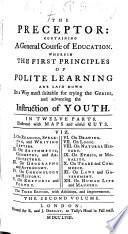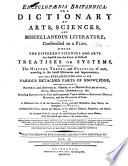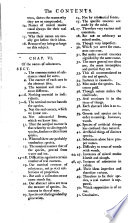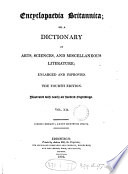 | John Locke - 1722 - 640 pages
...Principles that are fuppos'd Innate, when Reafon (if we may believe them) is nothing elfe, but the Faculty of deducing unknown Truths from Principles or Propositions that are already known ? That certainly can never be thought Innate, which we have need of Reafon to difcover, unlefs, as... | |
 | William Duncan - 1748 - 380 pages
...Mind. Reafon we have faid is the Ability of deducing unknown Truths, from Principles or Propofitions that are already known. This evidently appears by the foregoing Account, where we fee, that no Proportion is admitted into a Syllogifm, to ferve as one of the previous Judgments on... | |
 | Preceptor - 1758 - 590 pages
...Mind. Reafon we have faid is the Ability of deducing unknown Truths, from Principles or Propofitions that are already known. This evidently appears by the foregoing Account, where we fee, that no Propofition is admitted into a Syllogifm, to fcrve as one of the previous Judgments on... | |
 | Robert Dodsley - 1758 - 586 pages
...Reafon we have faid is the Ability of deducing unknown Truths, from Principles or Proportions thst are already known. This evidently appears by the foregoing Account, where we fee, that no Proportion is admitted into a Svllotrifm, to L rve as one of the previous Judgments on... | |
 | Colin Macfarquhar, George Gleig - 1797 - 422 pages
...mind. Reafon, we have faid, is the ability of deducing unknown truths from principle» or propofitions that are already known. This evidently appears by the foregoing account, where we fee that no propoiition is admitted into a fyllogifm, to ferve as one of the previous judgments on... | |
 | William Duncan - 1802 - 244 pages
...the progression brings intuitive certainty along with it. And now at length we may clearly understand the definition given above, of this distinguishing...principles or propositions that are already known. Thii «y,idently appears, • by the foregoing account, where we see, that no proposition is admitted... | |
 | William Duncan - 1802 - 258 pages
...faculty by which we push on our discoveries ; yet by the very definition of it implies no more, than an ability of deducing unknown truths from principles or propositions that are already known. Now, although this happy choice of intermediate ideas, so as to turnish a due train of previous propositions,... | |
 | John Locke - 1805 - 562 pages
...innate, when reason (it we , . • , ' ,.\ vers them, may believe them) is nothing else but the faculty of deducing unknown truths from principles, or propositions, that are already known ? That certainly can never be thought innate, which we have need of reason to discover; unless, as... | |
 | John Locke - 1805 - 554 pages
...rca:>ol>Jlscothat arc supposed innate, when reason (if we may believe them) is nothing else but the faculty of deducing unknown truths from principles, or propositions, that are already known ? That certainly can never be thought innate, Which we have need of reason to discover ; unless, as... | |
 | Encyclopaedia Britannica - 1810 - 816 pages
...mind. Reafon, we have faid, is the ability of deducing unknown truths from principles or propofitions that are already known. This evidently appears by the foregoing account, where we fee that no propofition is admitted into a fyllogifm, to ferve as one of the previous judgements on... | |
| |